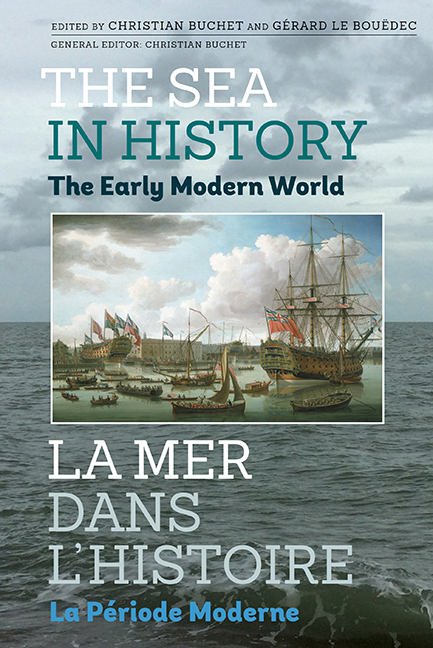Book contents
- Frontmatter
- Contents
- List of Illustrations
- List of Contributors
- Introduction générale et remerciements par
- General introduction and acknowledgements
- Introduction (français)
- Introduction (English)
- LA RÉUSSITE PAR LA MER:La reussite par la mer des territoires et des communautés littorales
- La construction d'un espace mondial: La circulation maritime et les ports
- La forte croissance de l'économie des pêches et des échanges
- Les acteurs de la dynamique maritime
- LA PUISSANCE MARITIME INSTRUMENT DE LA PUISSANCE POLITIQUE ET D'UNE STRATÉGIE GLOBALE DE RAYONNEMENT VOIRE DE DOMINATION: Les puissances maritimes occidentales
- L'océan Indien, entre convoitises et indifférences
- Les puissances maritimes asiatiques
- L'Afrique
- La politique maritime et l'idéologie
- De la décision de se tourner vers la mer
- La Chine et la mer. Retour sur images
- Mare Liberum, Mare Clausum: oceanic shipping and trade in the history of economic thought
- Social structure and naval power: Britain and the Netherlands
- British governmental values and British naval bureaucracy
- Les retombées littéraires et philosophiques des découvertes maritimes
- Le modèle maritime polynésien, ou l'océan source de stimulation intellectuelle
- Mer et développement technologique
- Développement maritime et maîtrise économique et financière
- Développement maritime et maîtrise organisationnelle
- Conclusion (français)
- Conclusion (English)
- Conclusion générale par
- General conclusion by
- Miscellaneous Endmatter
- Miscellaneous Endmatter
Mare Liberum, Mare Clausum: oceanic shipping and trade in the history of economic thought
from La politique maritime et l'idéologie
Published online by Cambridge University Press: 11 May 2017
- Frontmatter
- Contents
- List of Illustrations
- List of Contributors
- Introduction générale et remerciements par
- General introduction and acknowledgements
- Introduction (français)
- Introduction (English)
- LA RÉUSSITE PAR LA MER:La reussite par la mer des territoires et des communautés littorales
- La construction d'un espace mondial: La circulation maritime et les ports
- La forte croissance de l'économie des pêches et des échanges
- Les acteurs de la dynamique maritime
- LA PUISSANCE MARITIME INSTRUMENT DE LA PUISSANCE POLITIQUE ET D'UNE STRATÉGIE GLOBALE DE RAYONNEMENT VOIRE DE DOMINATION: Les puissances maritimes occidentales
- L'océan Indien, entre convoitises et indifférences
- Les puissances maritimes asiatiques
- L'Afrique
- La politique maritime et l'idéologie
- De la décision de se tourner vers la mer
- La Chine et la mer. Retour sur images
- Mare Liberum, Mare Clausum: oceanic shipping and trade in the history of economic thought
- Social structure and naval power: Britain and the Netherlands
- British governmental values and British naval bureaucracy
- Les retombées littéraires et philosophiques des découvertes maritimes
- Le modèle maritime polynésien, ou l'océan source de stimulation intellectuelle
- Mer et développement technologique
- Développement maritime et maîtrise économique et financière
- Développement maritime et maîtrise organisationnelle
- Conclusion (français)
- Conclusion (English)
- Conclusion générale par
- General conclusion by
- Miscellaneous Endmatter
- Miscellaneous Endmatter
Summary
ABSTRACT. With its strong economic leverage effect, maritime trade was a means of opening up regions to the world by allowing safer and greater volumetric exchanges than possible by land. As commercial liberty enhanced the economic development of the more water-connected nations to the detriment of others, these latter tried to counterattack by way of protectionist legislation to gain time to improve their competitiveness. From this perspective, the Anglo-Dutch example is particularly enlightening.
RÉSUMÉ. Puissant effet de levier économique, le commerce maritime a été le vecteur du désenclavement planétaire en permettant des échanges tout à la fois plus sûrs et plus volumineux que par voie terrestre. La liberté commerciale majorant le développement économique des nations les plus fluides au détriment des autres, ces dernières ont essayé de la contrecarrer par le biais de législations protectionnistes, le temps de faire émerger une situation plus compétitive. L'exemple anglo-hollandais est de ce point de vue particulièrement éclairant.
The trade of goods and the migration of labour were important factors in the economic growth of virtually every economy in the world, in particular of the West. Trade enables individuals, villages and cities, regions, countries and even continents to specialize in producing and exporting those services and goods that yield the highest profits and to import those produced cheaper elsewhere. Thus the rivers, canals, seas and oceans constituted an important stimulus for economic growth as the transportation of goods and people over water was not only safer than over land, but at the same time could be much more voluminous. During early modern times and until the arrival of rail transportation, the trade in bulk products would have been impossible without ships. Shipping enabled the creation of a world market with only two obstacles: transport costs, and national protective legislation. Two examples suffice to demonstrate this point.
Transport costs were an important factor in the creation of two separate circuits for the production and consumption of sugar. During the 16th century, the production of sugar cane became a near monopoly of the Portuguese colony of Brazil, while the refinement and consumption of Brazilian raw sugar spread to many countries in Europe.
- Type
- Chapter
- Information
- The Sea in History - The Early Modern World , pp. 671 - 678Publisher: Boydell & BrewerPrint publication year: 2017
- 1
- Cited by



